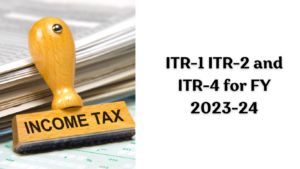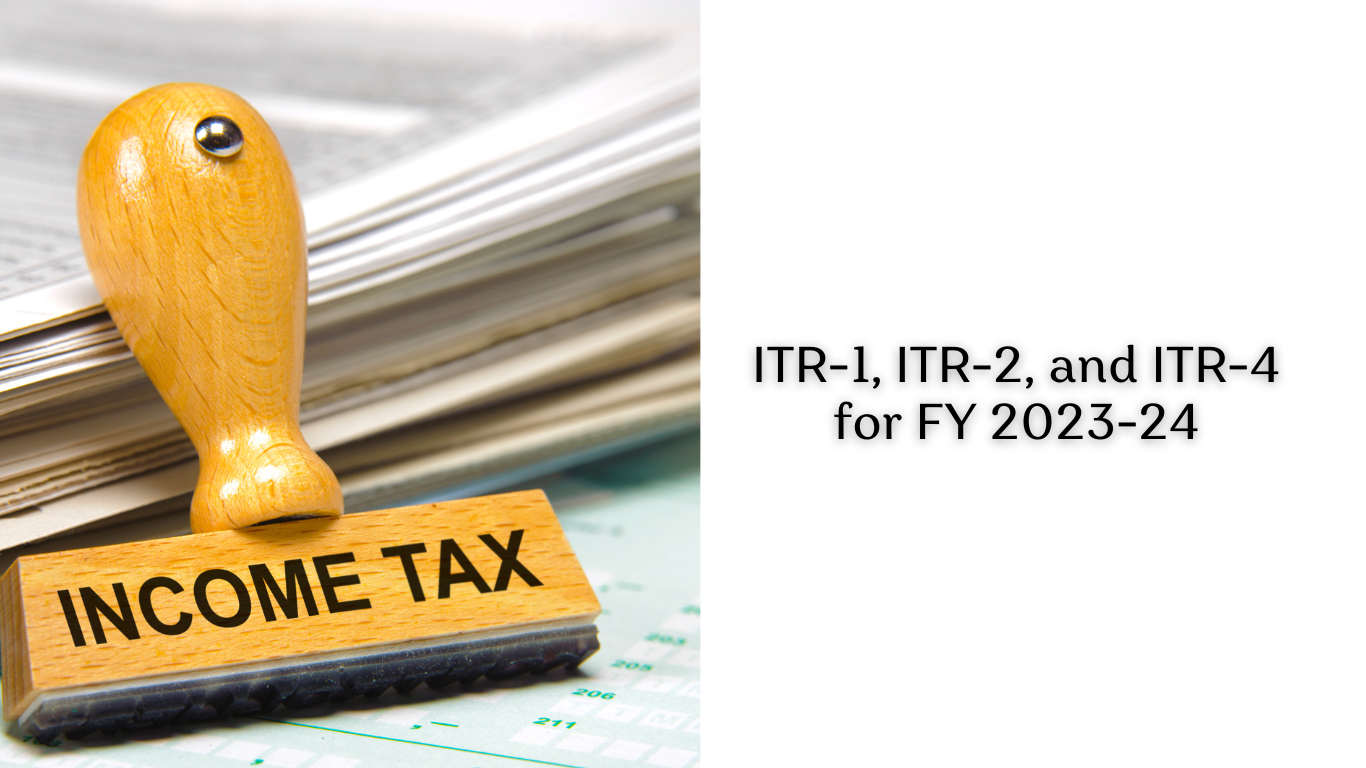ITR-1 ITR-2 and ITR-4 for FY 2023-24
As we embark on a new financial year, taxpayers are gearing up for the task of filing their Income tax returns (ITRs) for the financial year 2023-24. The Income Tax Department has introduced three primary forms – ITR-1, ITR-2, and ITR-4 – for e-filing purposes. This blog aims to provide a detailed overview of each form, helping taxpayers choose the most suitable option based on their income sources and financial situation.
ITR-1 (Sahaj):
ITR-1, also known as Sahaj, is designed for individuals with straightforward income sources. It is applicable to ITR-1, also known as Sahaj, is the simplified Income Tax Return form for individual taxpayers. It is primarily intended for salaried individuals and pensioners with relatively simple income sources. The form is designed to make the tax filing process easier and more straightforward for eligible taxpayers.
- Individuals earning income from salary or pension
- Income from one house property
- Other sources such as interest income, family pension, etc.
- Total income up to Rs. 50 lakhs

Filing Process:
ITR-1 can be filed online through the Income Tax Department’s e-filing portal.
E-verification of the return can be done using Aadhaar OTP, Net Banking, or by sending a signed physical copy of ITR-V (Acknowledgement) to CPC, Bangalore.
ITR-2:
ITR-2 is applicable to individuals and Hindu Undivided Families (HUFs) with income from various sources, excluding business or professional income. It is applicable to ITR-2 is the Income Tax Return form applicable for individuals and Hindu Undivided Families (HUFs) who have income from sources other than business or profession. It is suitable for taxpayers with more complex income streams, including capital gains, multiple house properties, and foreign assets or income.
- Individuals with income from salary, house property, capital gains, and other sources
- Individuals having income from foreign assets or foreign income
- Total income exceeding Rs. 50 lakhs
ITR-4 (Sugam):
ITR-4, also known as Sugam, is designed for individuals and HUFs having income from Business or Profession. It is applicable to:is the Income Tax Return form for individuals, Hindu Undivided Families (HUFs), and firms (excluding LLPs) who have opted for the presumptive income scheme under sections 44AD, 44ADA, or 44AE of the Income Tax Act. It is designed to simplify the tax filing process for small taxpayers with presumptive income.
Individuals and HUFs opting for the presumptive taxation scheme under sections 44AD, 44ADA, or 44AE
- Professionals with gross receipts less than Rs. 50 lakhs
- Total income up to Rs. 50 lakhs
Key Features and Considerations:
- Document Requirements: Before initiating the e-filing process, ensure you have all necessary documents, including PAN card, Aadhaar card, bank statements, Form 16/16A, investment proofs, and other relevant financial documents.
- E-Filing Procedure: Taxpayers can e-file their returns by visiting the official website of the Income Tax Department (https://www.incometaxindiaefiling.gov.in/). Select the relevant ITR form based on your income sources and taxpayer category.
- Data Entry and Verification: Fill in the required details accurately in the chosen ITR form. Provide information about your income from various sources, deductions claimed, and tax payments made during the financial year. Verify bank account details for seamless processing of refunds.
- Submission and Verification: After completing the form, review all information provided for accuracy. Once satisfied, submit the ITR electronically. An acknowledgment will be generated upon successful submission, which must be verified to complete the filing process.
- Tracking Refund Status: After filing your ITR, track the status of any TDS refund by checking the acknowledgment and refund processing emails sent by the Income Tax Department. Additionally, you can log in to the Income Tax website or contact the CPC Bangalore for updates on your refund status.
Conclusion:
Filing income tax returns is a crucial responsibility for every taxpayer, and with the availability of online ITR forms, the process has become more convenient and accessible. By understanding the features and requirements of ITR-1, ITR-2, and ITR-4, taxpayers can choose the most appropriate form and ensure a smooth e-filing experience for AY 2024-25.As the deadline for filing approaches, it’s imperative to act promptly and accurately to fulfil your tax obligations and avoid any penalties or legal consequences. So, gear up, gather your documents, and choose the Taxgyany Corporate ( www.taxgyany.com) for ITR form to embark on the journey of filing your income tax returns for the financial year 2023-24.


Hi, just wanted to mention, I enjoyed this post. It was practical.
Keep onn posting! https://www.waste-Ndc.pro/community/profile/tressa79906983/
Hi, just wanted to mention, I enjoyed this post.
It was practical. Keep on posting! https://www.waste-Ndc.pro/community/profile/tressa79906983/